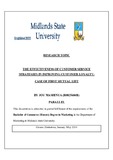Please use this identifier to cite or link to this item:
https://cris.library.msu.ac.zw//handle/11408/526| Title: | The effectiveness of customer service strategies in improving customer loyalty: case of First Mutual Life | Authors: | Mashinya, Joy | Keywords: | Customer service | Issue Date: | May-2014 | Publisher: | Midlands State University | Abstract: | The purpose of this study was to assess the effectiveness of customer service strategies engaged by First Mutual Life Assurance Company. The objectives being: to find out the effects that training employees on customer service have on customer loyalty; to identify if employee emotional intelligence results in customer loyalty; and lastly, to establish the effects of customer follow-up on customer loyalty. Studies on other customer service management strategies in the past decade, have been done by many scholars in other countries, but a study, particularly on these issues has not yet been made in Zimbabwe. The insights and concepts by these scholars were of significant help in the completion of this research study, as the research managed to identify knowledge gaps and close the gaps using the ideas and suggestions by other authors, which gave the researcher a more profound understanding of the customer service strategies and how these build customer loyalty. The research adopted exploratory and descriptive research design, using non-probability and probability sampling techniques. Questionnaires for collecting data on customers and employees were used, while management data collection was done using interviews, with the use of 118 respondents as the sample size out of a population size of 2569 people. With pilot testing having been done, data was gathered using interviews with management, questionnaires that were administered by researcher for customers and employees. The research found some challenges with obtaining information from management due to their busy schedules. Management was not available for some time during the research hence the researcher then booked appointments to interview them in order to overcome this challenge. In order to avoid respondents feeling uncomfortable to give the information they were assured by the researcher that their responses would be held in strict confidence. The data from the study was then presented, analysed and discussed by the research in relation to the research objectives. The research then concluded that employee customer service training, employee emotional intelligence, and customer follow up have a positive effect on customer loyalty. From the conclusions made, the research recommends that FML should identify areas that need training, conduct regular training in form of refresher courses, and make sure that management encourage the expression of positive emotions in every service encounter. The research also recommends that management should adopt the concept of regular follow ups so as to get feedback from customers about their service encounter. | URI: | http://hdl.handle.net/11408/526 |
| Appears in Collections: | Bachelor Of Commerce Marketing Management Honours Degree |
Files in This Item:
| File | Description | Size | Format | |
|---|---|---|---|---|
| mashinya.pdf | 1.03 MB | Adobe PDF |  View/Open |
Page view(s)
202
checked on Feb 10, 2026
Download(s)
212
checked on Feb 10, 2026
Google ScholarTM
Check
Items in MSUIR are protected by copyright, with all rights reserved, unless otherwise indicated.



